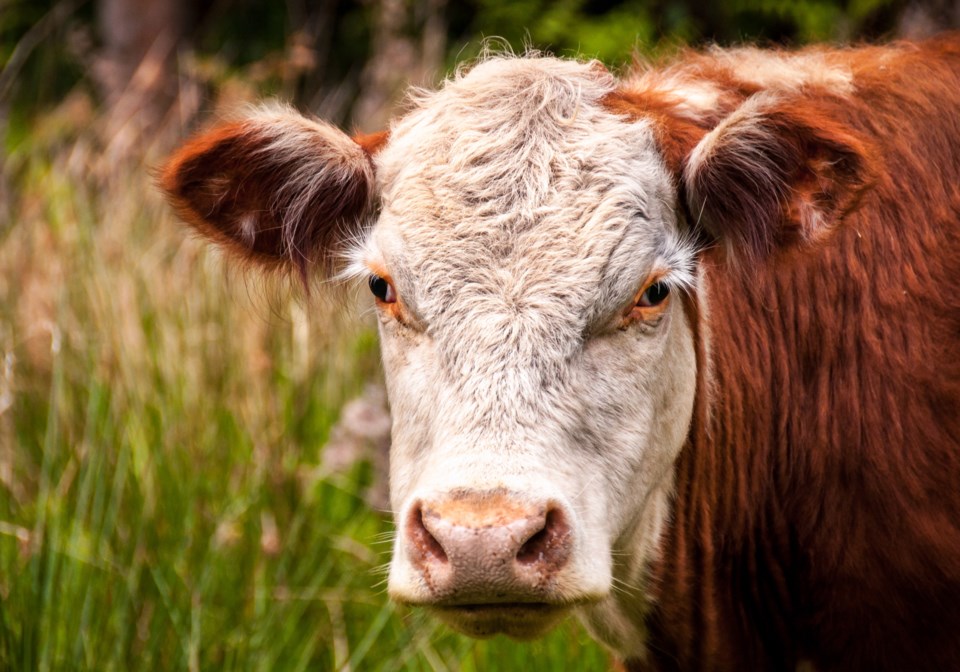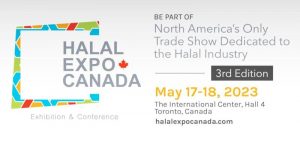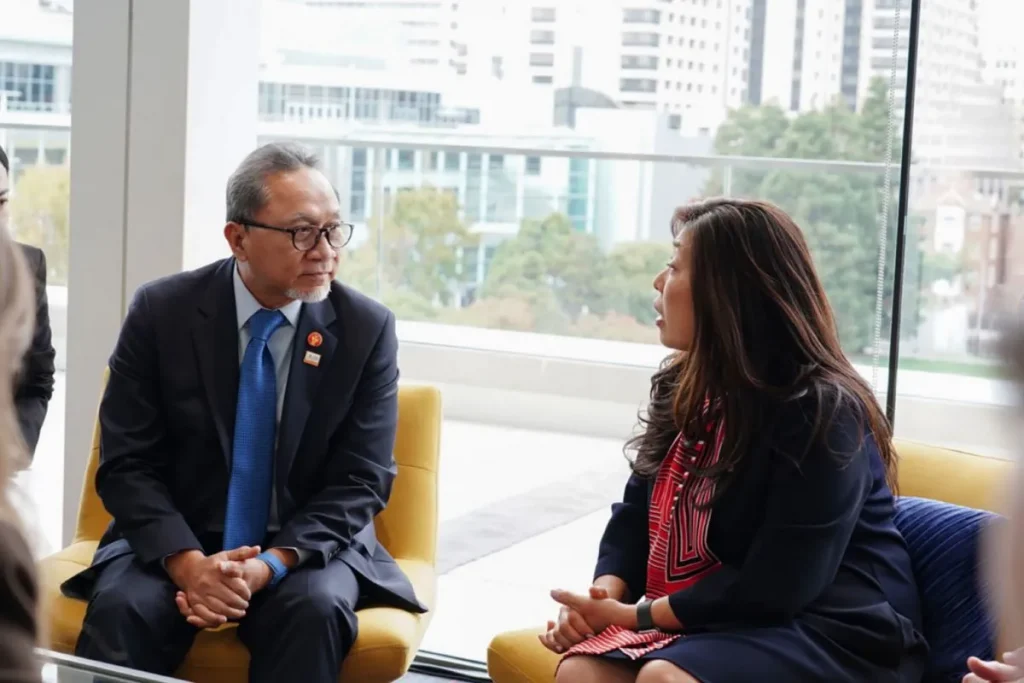
By Shannon VanRaes – Country Guide
In a more diverse Canada, many farmers are learning what halal actually means, and some are already finding ways to profit from its booming demand
Navigating the narrow aisles of his Winnipeg shop with the energy of a man half his age, Yusuf Abdulrehman pauses to point out bright spices, dark teas and pastel sweets that have travelled across the globe to reach his prairie outpost.
“We don’t only sell halal meat, we have a variety of products coming from all over the world, coming from Syria, from Lebanon, Jordan, Turkey, Egypt, Morocco, Tunisia. This is why you need to be at the store to see it all, there is so much here,” he says, pointing to shelves stacked high beyond his own reach with tea sets and kitchen accessories.
After directing one customer to a nearby freezer and pausing to quickly say “As-salãmu ‘alaykum” to another, Abdulrehman leads the way to a side room, pulling out a variety of well worn chairs and stools before settling in.
“I will start with this,” says the owner of Halal Meat Centre & Speciality Foods, leaning forward. “When I first came here and other immigrants came here from wherever it was they came from, they all started looking to see where they can get halal meat, but at that time you could not find it anywhere.”
The short-term solution for Muslims like Abdulrehman was to eat kosher products since both kosher and halal foods are pork-free, and they are slaughtered under similar conditions. But for the one-time salesman who fled political turmoil on Zanzibar with only the $20 he had sewn into his belt, the long-term solution was clear — he would open Winnipeg’s first halal store, even if it meant harvesting the animals in accordance with Islamic requirements himself.
More than three decades later, Abdulrehman still slaughters most of the meat sold in his store, but he is also able to purchase halal chickens from a local supplier and he notes that mainstream food companies now produce halal products as well.
Maple Leaf Foods launched Mina Halal, a line of hand-slaughtered chicken, in 2012. It was soon followed in 2013 by six value-added halal chicken products including nuggets. Sargent Farms in Ontario and Dunn-Rite in Manitoba also provide halal poultry, as do other small processors across the country. Cargill’s Dunlop facility in Ontario specializes in halal beef and SunGold Meats in Alberta specializes in halal lamb and goat. Other Canadian companies even sell halal bison and elk.
According to the 2011 National Household Survey, there are more than one million Canadian Muslims, up from about 580,000 Muslims in 2001, making it the fastest-growing religion in Canada and for producers, processors and marketers, halal consumers represent a growing and largely untapped demographic.
Despite increased availability of halal food in Canada, a 2014 survey found 70 per cent of halal households felt food companies were failing to meet their needs, while an additional 61 per cent of respondents felt major grocery chains fell short of expectations.
“There is definitely a lot of room for improvement,” says Salima Jivraj, managing director of halal at Nourish Food Marketing, which commissioned the survey. “Most of the 900 people we interviewed were from urban centres — from Toronto and the GTA — so if they feel they are being underserved then I can only imagine that Muslim Canadians in smaller centres, small communities are also underserved, probably more so than the people we spoke with.”
The difference between Toronto, Vancouver and Montreal and places like Corner Brook or Moose Jaw is clear to consumers like Shireen Ahmed. Today the sports writer and activist lives in Toronto, but she was born in Halifax and still treks out to the family cottage on Prince Edward Island each summer, which means stocking up before she hits the road.
“Here (in Toronto) we have incredible butcher stores where I can get everything from filet mignon, to chopped sirloin, to ribs, to Pakistani tandoori chicken, to wings, so you name it, here I can get it, and that is pretty awesome,” says Ahmed. “But if I drive out to P.E.I., I will take a cooler full of those kinds of foods, halal hotdogs, marshmallows, halal gummy candy, everything you can’t get there.”
While some stores on the East Coast do carry halal products, the mother of four says the selection is scant and prices are high. In some areas, there’s an alternative, of course, but it isn’t always convenient either.
“Basically, you go to a farm in rural Nova Scotia or wherever and you literally order a whole cow and that cow is chopped up and put in your freezer. That’s how a lot of people do it in those areas, compared to, say, in Mississauga,” explains Ahmed.
One place you might look is Oulton Farm, about halfway between Halifax and Wolfville, one of the few provincially inspected abattoirs offering halal slaughter on the East Coast.
Until about six years ago, Oulton’s was the only inspected halal provider in Nova Scotia. “We probably do about 500 or 600 goats each year, and that is limited by supply, basically,” says Wayne Oulton, whose parents founded the meat shop and first ventured into the halal market in the 1970s. “And we do about 2,000 lamb as well.”
“For local farmers, it’s great,” Oulton says, explaining the province lost its federal slaughter capacity, leaving producers reliant on provincial plants and local customers. “So I think as a local farmer, if we can sell it to a local business, that’s a better home for our animals that hopefully brings more dollars to everybody.”

We were looking at how to grow our business. One thing that was very apparent is that the ethnicity of the population of our country is changing.” – Miles Kliner, SunGold.photo: White Creek Ranch Photography
Thousands of kilometres west, near around Innisfail, Alta., one processor has turned to halal processing to diversify its consumer base and drive its business, only on a much larger scale. Since opening its doors in 1974, SunGold Specialty Meats has undergone many re-imaginings, but today the federally inspected lamb and goat processing plant is entirely halal, even though no one in the company’s ownership group is Muslim.
“We are actually owned by livestock producers, by farmers, so our ownership is a group of Alberta livestock producers,” says SunGold’s general manager, Miles Kliner, explaining how halal was identified as an underserved market during a long-range business planning exercise.
“We were looking at how to grow our business, asking how were we going to strengthen our business and researching the food service and retail landscape… consumers’ requirements, consumers’ taste, consumers’ interests,” says Kliner. “So in a nutshell, when you do all that research you put together that information… one thing that was very apparent, is that the ethnicity of the population of our country is changing and growing, and there is an opportunity to serve that market.”
The next steps were to research halal certification agencies, form a partnership with one, and begin the move towards meeting Islamic slaughter requirements, a process SunGold completed in 2006.

SunGold got into halal processing because so much Canadian demand was under-served, but it is already venturing into global markets too, with sales to the Middle East and Hong Kong.photo: White Creek Ranch Photography
For most halal consumers, the term means that a healthy animal has been slaughtered by a Muslim, killed with a swift neck incision as the butcher thanks God for the animal. Pork is also forbidden under Islamic dietary law.
“The word halal means permissible,” says Abdulrehman, “which means you make sure the knife is sharp and that when you do the slaughter, you do the job as quick as you can so you do not torture that animal. At the same time, what you are doing, is you are thanking your lord for allowing you take a life from another living creature for your own sustaining.”
Dhabihah (or Zabiha) is the term most often used to describe the ritual slaughter that makes meat halal, and Kliner says there isn’t a day that goes by when the SunGold website doesn’t receive a question or comment from consumers, some of which are about halal processing, wondering about how it all works and if it’s humane. The general manager assures customers it is, explaining how ancient techniques and modern practices are combined to ensure animal welfare requirements are met or exceeded.
“Done properly, they don’t feel any pain, this is a must for us,” says Kliner, explaining animals are restrained and stunned prior to harvest. “I’ve had consumers call up and they are really irate with me on the phone, almost to the point where I can’t get a word in edgewise… but when they calm down and actually hear me describe the process… they come away with the feeling that they were really glad they called.”
Back in Toronto, Jivraj agrees there is no reason halal isn’t compatible with modern meat processing methods. The editor of Halal Foodie recently returned from Alberta where she spoke to producers about the business possibilities halal offers the cattle industry.
“With beef there is the issue of captive bolt stunning,” she says. “And that was one of the main questions I got in Alberta, how do we work around that? And from my conversations with the certifiers, they say it’s just a matter of us working with them to find a solution.”
It’s not that captive bolts aren’t allowed, she adds, it’s that for the meat to be halal, the ritual slaughter must occur after the bolt is applied, but before animal is dead.
“It’s a matter of timing,” Jivraj says.
However, some questions about halal slaughter have less to do with concerns about animal welfare and more to do with anti-Muslim sentiments and far-right ideology. It doesn’t take more than a few seconds of online searching to come across racist or ignorant diatribes, posted under the guise of providing information about halal slaughter.
Some of the calls Kliner receives have reflected that xenophobic sentiment.
“Honestly, in today’s day and age with all we see and hear in the media, that’s not good,” says Kliner. “It’s important for us to be able to tell the story with the facts and ensure that people aren’t just running off in some direction making assumptions.”
Kathy Twardek, director of consumer protection and market fairness for the Canadian Food Inspection Agency, notes that all products produced in federally inspected facilities must meet the same health and animal welfare requirements, whether they are halal or not.
The agency also implemented labelling requirements last spring, requiring halal product labels to be accompanied by the name of the organization that certified the product as halal.
“(The regulations) were put in place to respond to the need for a more consistent approach to the labelling of halal products,” says Twardek. “There are different interpretations of halal and different certifiers follow different processes… so by providing the certification body, consumers are able to decide if the type of halal they are looking at is what they are looking for.”
The move has garnered a mixed reaction from consumers, with many feeling there isn’t enough oversight of the certifiers.
“It’s a great first step… but because there is no accreditation, anyone can be a certifier,” says Jivraj. “If I have a product, I could actually open up a side certification business and then certify myself because there is no one governing that.”
What she’d like to see is a national accreditation agency pulled together by the religious community, but with the additional authority of government backing. Still, there’s another issue that is gaining even more priority.
“For some reason, the main focus right now is chicken: is it slaughtered by hand or is it slaughtered by machine?” Twardek says. “The traditional method is slaughtered by hand and it is preferred, but a lot of people also accept machine slaughtered, so that is really where the variance is occurring, but it is just a matter of what your certifier tells you.”
At Waldner’s Meats in Niverville, Man., the value that customers place on hand-slaughtered birds has been long apparent. The small, provincially inspected processor slaughters about 42,000 each year, supplying stores such as the one owned by Abdulrehman.
Angela Chipilsky says they bring in a halal harvester every time they process poultry. “He comes out when we process our birds and he hand cuts and blesses every one,” she says, adding the hand processing seems especially important to their older generation of clients.
Other trends are also emerging in the halal market. While earlier generations were generally only concerned about whether a product was permissible, Jivraj says Canadian-born Muslims are often searching for additional qualities, such as food that is organic or locally produced.
“Especially with the millennial generation that is coming up now, they are the ones that are born here and they don’t have the same struggles as their parents did, so they are not looking for fast and easy, they are starting to look at quality,” Jivraj says. They also lack the sentimentality about the brands and products from their homeland, making tiny shops like Abdulrehman’s less alluring to second-generation Muslim Canadians.
But back in his Winnipeg store, Abdulrehman isn’t concerned about declining customers or competition from the big retailers. That’s because stores like his are benefiting from yet another cultural shift.
“The customers have changed, they have diversified. Now I am not only catering to the Muslim community, I am catering to the general public as well. I have more clients now that are not of the Islamic faith,” he explains.
Some come for goods like carbonated yogurt drinks and spices, but they also buy halal meat. Even at chain retailers, more non-Muslims are buying halal products.
A report published in Canadian Grocer Magazine notes that while 11 per cent of all meat sold in the United Kingdom is halal, Muslims only account for three per cent of the population.
Canadian Grocer Magazine went on to say, “the concept of halal has extended far beyond a religious choice, also attracting consumers who are environmentally conscious (and) health conscious.”
Jivraj, who also founded Canada’s first Halal Food Festival four years ago, is optimistic. “I think it is only going up because the population is increasing,” she says. “We have one million Muslims right now in Canada, and that number is expected to triple in 20 years. It is growing 13 per cent annually, and the the higher the population, the more the demand, the more the growth.”
But while Agriculture and Agri-Food Canada puts the value of the Canadian halal market at an estimated $1 billion, a 2014 report by Thomson Reuters estimates the value of of the global halal market will reach US$1.6 trillion by 2018. It offers Canadian producers and processors a whole new set of opportunities, says Jivraj.
“Canada will be in a really, really good position to be exporting,” Jivraj says. “Canada as a whole is seen by other countries, like China or in the Middle East, as this pure country with this vast open land base and grazing cattle. We have this image so our meat is seen as premium, but we are not pushing it much in the halal category.”
Ron Davidson of the Canadian Meat Council suggests this could be because different countries have different halal requirements, meaning a halal processor on the Prairies might be able to export to the United Arab Emirates for example, but not to Indonesia or Malaysia, where the market is considerably larger.
“Companies are trying to adjust to that and we are certainly interested in the halal market — there is quite a bit of meat going to these countries and there is quite a bit of room for growth,” Davidson says. “So we are trying to satisfy the requirements for different countries and that is a challenge for the plants.”
Smaller operations like SunGold have made inroads into the Middle East, as well as into Hong Kong. And in 2014 another Alberta-based meat processor, Prairie Halal Foods, opened its first office in Dubai.
“In Dubai, where there is a lot of New Zealand lamb consumed, we service the high-end restaurants at hotels and resorts,” says Kliner, noting SunGold exports are premium, grain-finished products.
Halal beef from Canada also makes it into overseas markets, with about half a dozen smaller, federally inspected plants processing it in Alberta and Ontario. But Duane Ellard of Canada Beef says the market isn’t often a priority because halal beef production is associated with an increased production cost.
“When you incorporate another process in the harvesting process, it comes down to a financial consideration,” Ellard says. “So there is an extra person that has to be in attendance, there has to be a certification, there needs to be a program in place, records have be kept, from a harvesting perspective, there is quite a bit of regulation.”
Still, consumption in Canada has grown three per cent in the last five years, and the organization does promote Canadian halal harvest in the Middle East, North Africa and the European Union.
For those who do seek halal certification, market opportunities in Canada and abroad seem ripe. But will Canadian processors take advantage of it?
“Canada sits at a really great place just because of our agricultural ability,” Jivraj says. “We are also maturing as a community ourselves and many of us are second-generation, third-generation Canadian and our demands are that we want to be more and more like our peers. We want products that are mainstream… there is only growth ahead.”



